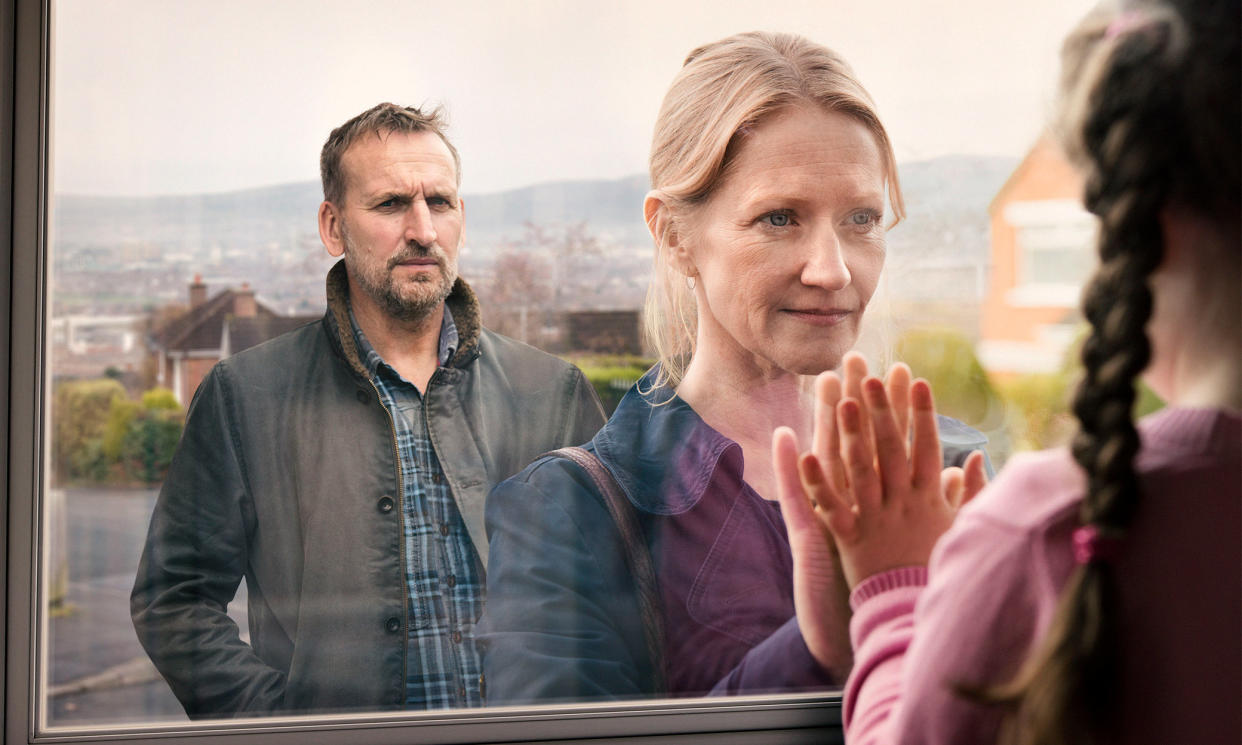How Come Home asks audiences to understand characters that are difficult to like

It’d be easy, really, to dislike Marie. Certainly, the premise will predispose most of the audience against her; Come Home follows the story of Greg (Christopher Eccleston), a single father, and Marie (Paula Malcolmson), the wife who walked out on him eleven months prior. Immediately, Come Home subverts typical expectations about mothers and fathers, and poses the audience questions that could prove difficult. Can they understand Marie, despite their assumptions?
The first episode focuses primarily on Greg, establishing the status quo of his and his children’s lives following Marie’s departure; there’s something significant about the fact that audiences are given Greg’s perspective first, immediately inviting them to sympathise with him ahead of Marie. As the question of why she left hangs over the piece, what Come Home presents is a family clearly struggling. Christopher Eccleston gives a quiet, almost defeated performance; it’s dripping with melancholy, wearing his heartbreak on his sleeve. He’s easy to empathise with, a lonely man who seems full of empathy himself, taking in Brenna (Kerri Quinn) and her son to protect them from her abusive husband. When he sees Marie, all he wants is to know why – and so do we.
The answer is complex, a combination of post-natal depression, lingering guilt over an affair, and a feeling of being trapped and stifled by marriage. There’s no one reason why she left, no breaking point; it’s something writer Danny Brocklehurst deliberately subverted, noting from the beginning that they were going to avoid “a big reveal to explain why she left”. Instead, her motivations are impulsive, selfish and difficult to understand, perhaps sometimes even for herself. But by the same measure, they’re also personal, nuanced and above all necessary. The drama benefits from a striking performance from Paula Malcolmson, who’s able to elicit sympathy even as the audience almost instinctively pulls away from her – she’s difficult to stop watching, holding the audience’s attention even despite their preconceived notions about her. Much of Come Home is about asking audiences to see and accept that both things can be true – to try and understand the character, irrespective of whether or not they like her.

There’s a sense, admittedly, that perhaps Come Home doesn’t quite go far enough in trying to present Marie’s perspective. Certainly, she doesn’t get a focal episode in the same way Greg did, a piece of drama that pivots around her almost entirely; where Marie is largely absent from the first episode, defined explicitly by said absence, Greg remains an important presence across all three episodes. You never see Marie independent of Greg, and so too never quite foreground her perspective; there’s a distance from her still, even as the series continues. Certainly, it’s difficult to exactly get a handle on exactly why she decides to enter into the custody battle she’d previously eschewed; Marie’s motivations still feel just a little opaque, at a point when the character study probably should have been delving a little deeper into her psyche.
What’s interesting, though, is that Come Home does start to pull back assumptions about Greg, gradually becoming clear that he isn’t the saint he initially seemed. He’s selfish, keeping Brenna around despite her acrimonious relationship with his children – but it’s a selfishness that’s understandable, justified to himself by his loneliness, even as it’s difficult to agree with his choice, or to like it. A harder question posed, though, comes when it’s revealed Greg lied about having a vasectomy, essentially tricking and manipulating Marie into having their third child – the child that sent her into a depressive spiral. Can the audience still like him – can they understand him? While we don’t quite get to see Greg through Marie’s eyes in the same way we see her through his, the sheen and lustre start to fall away. There’s much more nuance to the situation than there appeared when it was presented from Greg’s point of view.
Come Home is messy, in a way that can be frustrating. By the end, there’s not a straightforward antagonist or protagonist – both Greg and Marie become steadily more difficult to unreservedly ‘root for’ in the traditional sense. There’s no real victory for either, with a conclusion that dwells mainly on the sadness of it all. But, equally, that’s the point. It’s deliberately anticlimactic, much as life is. There are nuances and caveats and sins on each side. Ultimately, Come Home deliberately and consciously rejects the idea that either Greg or Marie is entirely in the right; it aims for something far more complex and intricate. Where it’s able to succeed, Come Home presents a genuinely poignant vision of two people whose family fell apart, just as much because of as despite themselves.
Related:
Collateral is an intimate drama, fascinated by individuals and sceptical of institutions
Trauma was a haunting meditation on destructive grief
Like this article? Hate this article? Why not follow me on twitter for more, or send me a message on facebook to tell me what you thought? You can also find more of my articles for Yahoo here, or check out my blog here.

 Yahoo Movies
Yahoo Movies 

